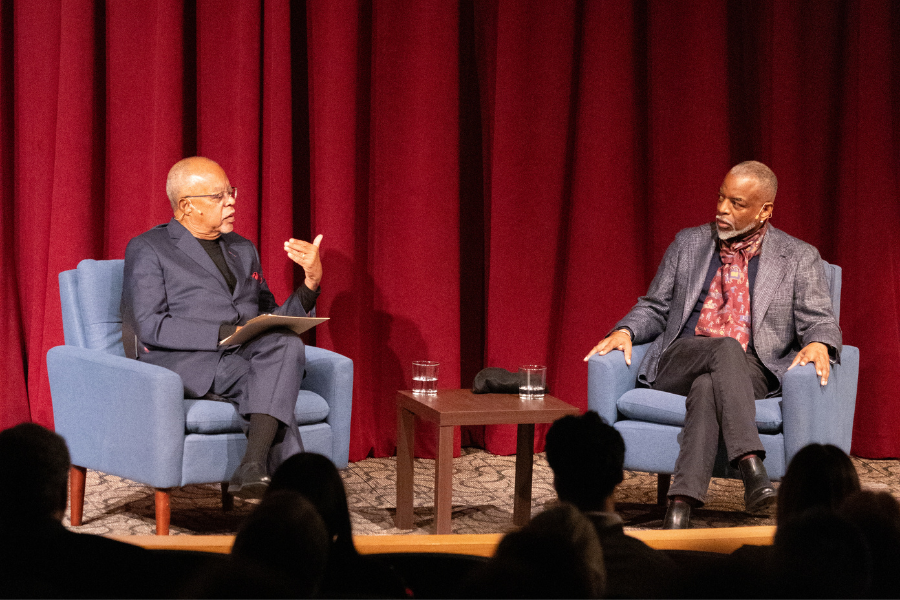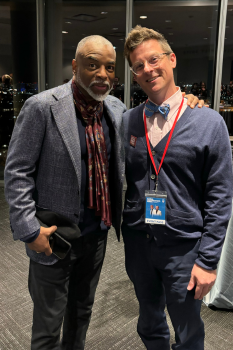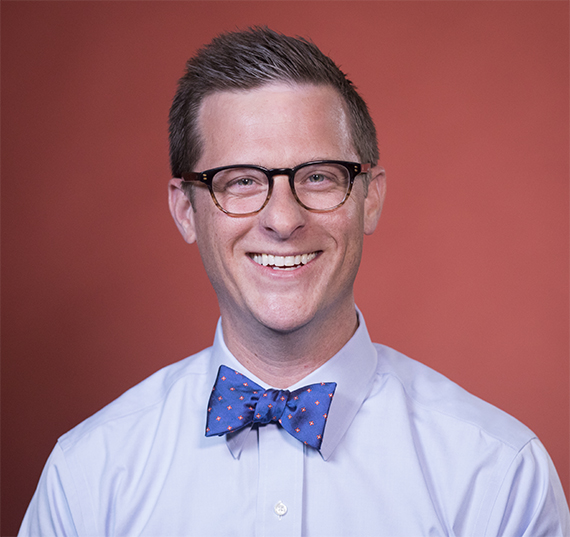
The PBS Series “Finding Your Roots” is celebrating its 10th season. Hosted by Henry Louis Gates Jr., each episode takes a deep dive into two or three celebrities’ genealogical and family histories. On Jan. 11, 2024, Gates gave the Loyola Marymount University campus community a sneak peek at Season 10, Episode 3, “Fathers and Sons.” which explores the lineage of actors LeVar Burton and Wes Studi. Executive Vice President and Provost Thomas Poon, Ph.D., opened the evening by speaking about the impact of Gates’ series, most notably its ability to illustrate the “shared intersectionality” of our communities. Gates and Burton hosted a brief Q&A following the episode’s premiere in a sold-out Hilton Auditorium.
About LeVar Burton

Burton understands the importance of telling stories that are an accurate reflection of our world. He has repeatedly shown us that the written word is a portal through which we can discover more about ourselves, our families, and our environment. Speaking about “Reading Rainbow” in 1993, he told Daily Variety: “We can share critically important knowledge and information by addressing the issues and concerns of what it’s like to grow up in today’s world.”
LeVar Burton was the host and co-producer of the Emmy Award-winning series “Reading Rainbow,” which ran from 1983 to 2006 on PBS. He is perhaps best known for his role as Lt. Cmdr. Geordi La Forge on “Star Trek: The Next Generation” as well as his portrayal of Kunta Kinte in the 1976 miniseries “Roots.” In his appearance on “Finding Your Roots,” Burton discovers that not only does he have white ancestry, but that his ancestor served on the Confederate side in the American Civil War. When asked whether this revelation made him feel any “less Black,” Burton pointedly responded: “No. Because I know who I am.”
I often refer to LeVar Burton is the patron saint of libraries. Mind you, he’s not the only one. Dolly Parton certainly sits with him in our pantheon of living saints, as do Stephen Fry and Barack Obama. P!nk is currently appealing for library canonization given her activities in Florida this past year. Burton, however, holds a special place in the hearts of librarians. In addition to his remarkable work for the venerated Reading Rainbow, Burton has been a staunch advocate for the freedom to read and a champion against efforts to ban books in schools and libraries.
Book Banning in the U.S.
Between July 2021 and June 2023, PEN America’s Index of School Book Bans recorded 5,894 instances of book bans. These attacks have targeted no fewer than 2,076 authors, 517 illustrators, and 31 translators. Most of the books challenged are those written for young adults, especially those dealing with racism and historically marginalized identities, i.e., people of color and members of the LGBTQ+ community.
PEN defines a ban as “any action taken against a book based on its content … that leads to a previously accessible book being either completely removed from availability to students, or where access to a book is restricted or diminished.” While not every book that is challenged will be banned outright, among the thousands of instances mentioned above, 27 percent were banned completely from local libraries and classrooms, making the books inaccessible to local communities outside of commercial sources.
In Escambia County, Florida, more than 1,600 books have been banned pending investigation. In Texas, a recently enacted law sought to require booksellers to provide an unnecessary rating for books containing “sexual relevance,” an act that would undoubtedly have had a disproportional effect on books written by, for, and about LGBTQ individuals. Florida and Texas infamously lead the nation in banned books attempts, but the crisis has reached 41 states. In St. Marys, Kansas, a public library was required to purge its shelves of any LGBTQ young adult books in order to get the city to renew its lease.
Librarians Fight Back
Not to put too fine a point on it, the freedom to read is under attack. Regardless of whether it is coming from federal, state, or city governments, from private individuals, or from coordinated campaigns, librarians have repeatedly stood against those who would seek to restrict access to books, to censor ideas that might be objectionable to some, or to limit for others what is “appropriate” material for a given reader.
In 2022, Brooklyn Public Library launched “Books Unbanned,” a program that offers teens across the country free online access to books banned in their local schools. Since then, Seattle Public Library, Boston Public Library, LA County Library, and San Diego Public Library have announced plans to join program. Librarians in Texas, Colorado, and Wyoming have filed workplace discrimination lawsuits for being fired in response to their refusal to ban books. Thankfully, we also have champions like Burton to fight alongside us.
Burton on Book Bans
In 2022, Burton appeared on “The View” to discuss his latest documentary. In a brief aside, he spoke about recent efforts to ban books in the U.S. “We have this aversion in our country to knowing about our past and anything that is unpleasant. This is not going away. So, read the books they’re banning. That’s where the good stuff is.” The following year, the American Library Association named Burton honorary chair of its annual Banned Books Week celebration. In the press release, Burton reminded us: “Books bring us together. They teach us about the world and each other. The ability to read and access books is a fundamental right and a necessity for lifelong success.”
Throughout his life and his work, Burton has demonstrated the power of knowing the story. We must continue to share stories, the read stories, and to support the librarians and teachers who make those stories accessible to anyone who needs them. For how can we best discover our shared intersectionality if not through the art of storytelling?
Thank you, LeVar, for your advocacy on behalf of writers and librarians. Thank you for your support of teachers and their students. Most of all, thank you for showing us that through stories we can go anywhere.
To watch a recording of the conversation between Gates and Burton, visit the LMU YouTube page.







